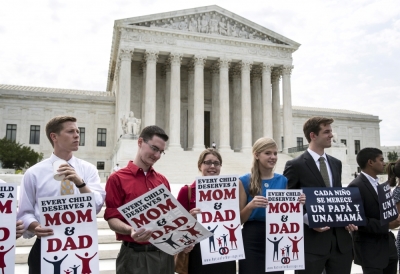The little known case that led to gay marriage and abortion
Obergefell v. Hodges (2015)

On the 12-year anniversary of the Lawrence v. Texas ruling, the Supreme Court ruled 5-4 that states could not pass laws or constitutional bans against same-sex marriage.
Justice Kennedy, the author of the Lawrence majority, also wrote the majority opinion for this case, again citing Griswold multiple times among the past cases that justified the ruling.
“This analysis compels the conclusion that same-sex couples may exercise the right to marry,” he wrote. He stated that with Griswold and the other cases, “this Court’s cases describing the right to marry presumed a relationship involving opposite-sex partners.”
“In addition, these liberties extend to certain personal choices central to individual dignity and autonomy, including intimate choices that define personal identity and beliefs.”
Chief Justice John Roberts authored a dissent, in which he also cited Griswold, pointing out that it and the other cases stood in contrast to the demand to legalize gay marriage.
“Unlike criminal laws banning contraceptives and sodomy, the marriage laws at issue here involve no government intrusion. They create no crime and impose no punishment,” dissented Roberts.
“Same-sex couples remain free to live together, to engage in intimate conduct, and to raise their families as they see fit.”




























